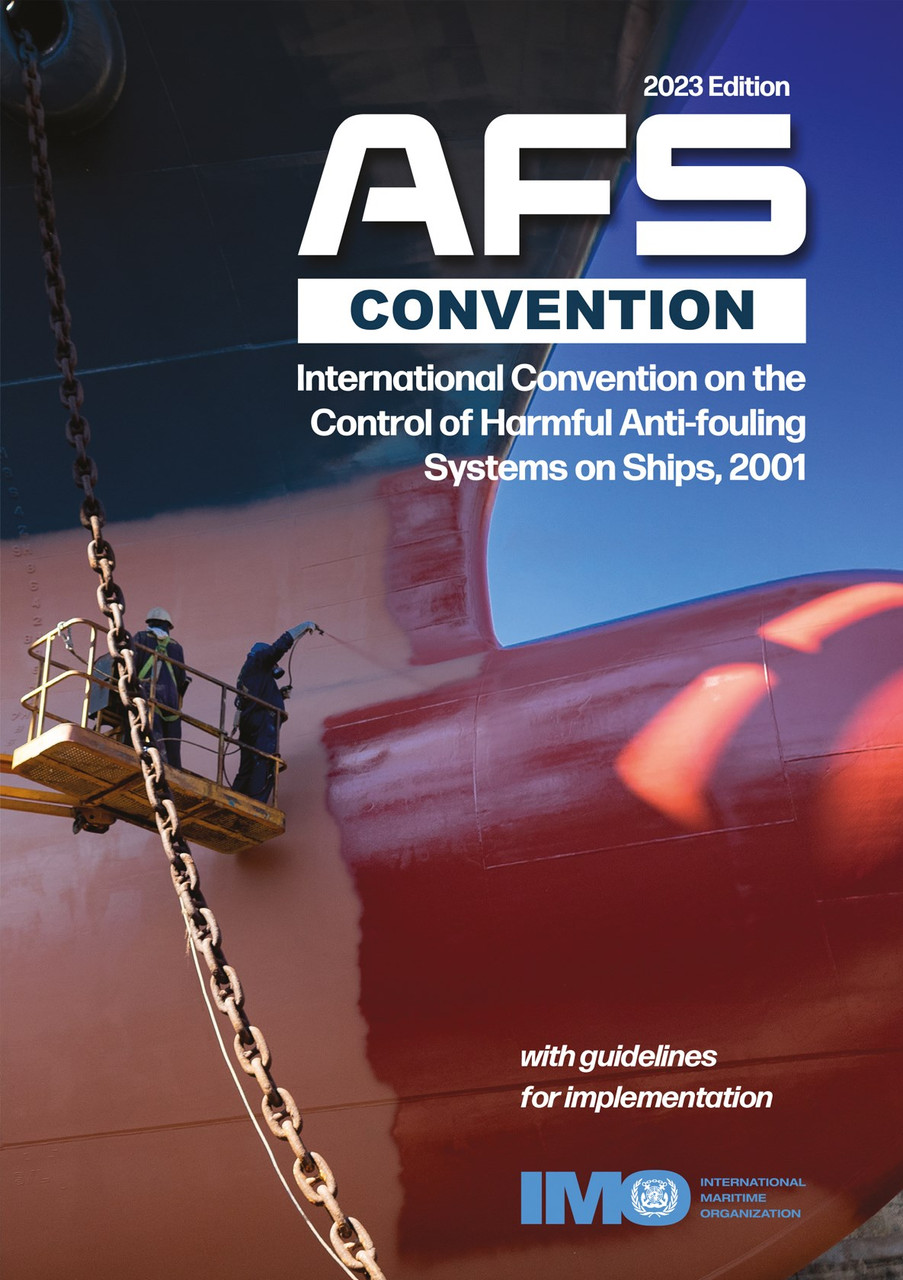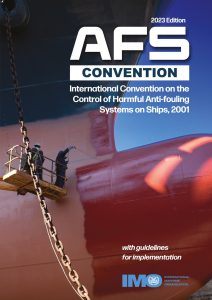A Global Response to Toxins in Ship Coatings and Marine Pollution
Toxic Paint, Global Consequences
Imagine a layer of paint that seems harmless but slowly leaks toxins into the ocean, harming marine life, disrupting ecosystems, and entering the food chain. This was the reality for decades, as ships around the world used anti-fouling paints that were effective at preventing biological growth—but dangerous to the environment.
To address this invisible but serious threat, the International Convention on the Control of Harmful Anti-Fouling Systems on Ships (AFS) was adopted. The AFS Convention is a key international treaty designed to protect our oceans and marine biodiversity by banning or restricting harmful substances in ship coatings.
In this article, we’ll explain what the AFS Convention is, why it matters, and how it works—offering valuable insights for beginners, students, professionals, and anyone interested in sustainable maritime practices.
What Is the AFS Convention?
The AFS Convention is a global agreement adopted by the International Maritime Organization (IMO) to prohibit the use of harmful anti-fouling paints and coatings on ships and to control their spread.
Key Facts
-
Full Name: International Convention on the Control of Harmful Anti-fouling Systems on Ships
-
Adopted: October 5, 2001
-
Entered into Force: September 17, 2008
-
Administered by: International Maritime Organization (IMO)
-
Parties: 96 countries (representing over 95% of the world’s shipping tonnage)
The Convention primarily aims to protect marine ecosystems and human health by eliminating toxic compounds, starting with organotin compounds like tributyltin (TBT).
Background: What Are Anti-fouling Systems, and Why Were They a Problem?
Ships often face the problem of biofouling—the accumulation of algae, barnacles, and other organisms on their hulls. This reduces speed, increases fuel consumption, and raises greenhouse gas emissions.
Anti-fouling Systems (AFS)
To combat fouling, ships use coatings or paints that prevent organisms from attaching to their hulls. These systems are called anti-fouling systems.
However, many early systems used highly toxic substances, especially organotin compounds, such as tributyltin (TBT). These substances leached into the water, causing:
-
Deformities in marine species (e.g., “imposex” in snails)
-
Disruption of marine food chains
-
Long-lasting contamination in sediments
-
Toxicity to shellfish and fish species
-
Threats to human health via seafood consumption
By the 1990s, scientific evidence had made it clear: the environmental cost of these coatings was too high.
Goals and Structure of the AFS Convention
The AFS Convention aims to phase out the use of harmful anti-fouling systems, prevent their transfer between regions, and create a standardized process for future technologies.
Core Objectives
-
Ban specific harmful substances, such as organotin compounds
-
Prevent the spread of harmful substances through ship movements
-
Set up a certification and inspection system for compliance
-
Establish a mechanism to evaluate and regulate new anti-fouling technologies
The Convention also introduces the AFS Certificate, a legal requirement for ships over 400 gross tonnage engaged in international voyages.
How the AFS Convention Works
The Convention operates through a “controls and restrictions” mechanism, which allows parties to agree on banned substances and enforce standards for shipowners.
Key Implementation Measures
-
Ban on Tributyltin (TBT)
-
Since 2008, ships may not apply AFS containing TBT.
-
Vessels with TBT-based systems must either remove them or cover them with a non-leaching sealer coat.
-
-
AFS Certificate and Inspection
-
Ships ≥400 GT must carry an AFS Certificate issued by their flag state or recognized organizations.
-
Ships <400 GT must carry a Declaration of Compliance, especially if they engage in international voyages.
-
-
Global Harmonization
-
AFS systems must comply with approved performance and safety standards set by the IMO.
-
Paint manufacturers must label products accordingly.
-
Real-World Applications and Case Studies
1. Japan and Coastal Protection
Japan, with its extensive fishing industry, was one of the first nations to enforce strict anti-fouling regulations. Post-AFS Convention, Japanese ports inspected foreign vessels for compliance, protecting their coastal ecosystems from external contamination.
2. Norway’s Ship Maintenance Industry
Norway developed TBT-removal facilities, offering environmentally safe hull cleaning services for ships needing to comply with the AFS Convention. This created new green industry opportunities while supporting marine conservation.
3. Caribbean Biodiversity Preservation
Island nations in the Caribbean, vulnerable to marine pollution, adopted the AFS Convention to protect coral reefs and support ecotourism-based economies. The region also joined IMO training programs on biofouling management.
Benefits for Different Audiences
For Beginners and General Readers
The AFS Convention helps ensure the seafood we eat is safer, marine animals are protected, and oceans remain cleaner by stopping the use of toxic ship paints.
For Students and Researchers
This Convention is a major case study in marine environmental law, international cooperation, and ecotoxicology. Researchers also explore the development of eco-friendly antifouling technologies (e.g., biomimetic coatings, silicone-based systems).
For Maritime Professionals and Industry Experts
Shipowners, classification societies, and port authorities use AFS guidelines for:
-
Ship retrofitting projects
-
Regulatory audits and inspections
-
Environmental risk management
-
Developing green shipping solutions
Latest Trends in Anti-fouling Technologies
As the industry moves beyond toxic coatings, there is increasing interest in innovative, non-toxic alternatives.
Emerging Solutions
-
Foul-release coatings: Use silicone or fluoropolymers to create a slick surface that organisms can’t stick to.
-
Ultrasound anti-fouling: Systems installed in hulls to deter biofouling without chemicals.
-
Biocide-free paints: Use physical properties (e.g., surface microtextures) to discourage attachment.
-
Nanotechnology: Developing surfaces that mimic sharkskin to prevent fouling.
These alternatives are compliant with the AFS Convention and part of the wider shift toward sustainable shipping.
Key Challenges and Debates
Despite progress, there are ongoing challenges that affect AFS Convention implementation globally.
Main Issues
-
Illegal coatings still in use on older vessels, particularly in countries with limited enforcement.
-
High costs for eco-friendly alternatives can discourage smaller operators.
-
Biofouling beyond coatings (e.g., in sea chests, propellers) still poses an environmental risk.
-
Lack of global harmonization in port-state control inspections and approval systems.
IMO is working with stakeholders to improve compliance, transparency, and capacity-building, especially in developing nations.
Frequently Asked Questions (FAQs)
What is the AFS Convention?
The AFS Convention is an international treaty that regulates harmful anti-fouling systems (such as certain ship paints) to protect marine environments.
What are anti-fouling systems?
These are coatings or paints applied to ship hulls to prevent the growth of marine organisms like barnacles, algae, or mussels.
Why was tributyltin (TBT) banned?
TBT was banned due to its severe toxicity to marine life, causing deformities, reproductive failure, and long-term environmental damage.
Which ships need an AFS Certificate?
Ships ≥400 GT engaged in international voyages must carry an official AFS Certificate issued by a flag state or recognized organization.
Conclusion: Clean Hulls, Cleaner Oceans
The AFS Convention represents a major global achievement in marine environmental protection. It demonstrates how science, policy, and industry can come together to stop harmful practices and chart a course toward safer, more sustainable seas.
By banning toxic coatings and encouraging safer alternatives, the Convention not only protects marine biodiversity but also enhances the efficiency, safety, and reputation of international shipping.
🌊 Call to Action:
Whether you’re a student, seafarer, policymaker, or environmentally conscious citizen—learn more about anti-fouling systems, support compliance efforts, and champion marine protection wherever possible.
References / Further Reading
-
International Maritime Organization (IMO): https://www.imo.org/en/OurWork/Environment/Pages/Anti-fouling.aspx
-
UNEP. (2021). Marine Pollution and Anti-fouling Systems
-
GEF-UNDP-IMO GloFouling Partnerships Project: https://www.glofouling.imo.org
-
European Chemicals Agency (ECHA): Assessment Reports on Biocidal Products
-
United Nations Sustainable Development Goals – SDG 14: https://sdgs.un.org/goals/goal14



THANKS FOR THE AFS CONVENTION MARINE ARTICLE!